中式英语之鉴
- 格式:ppt
- 大小:1.70 MB
- 文档页数:14
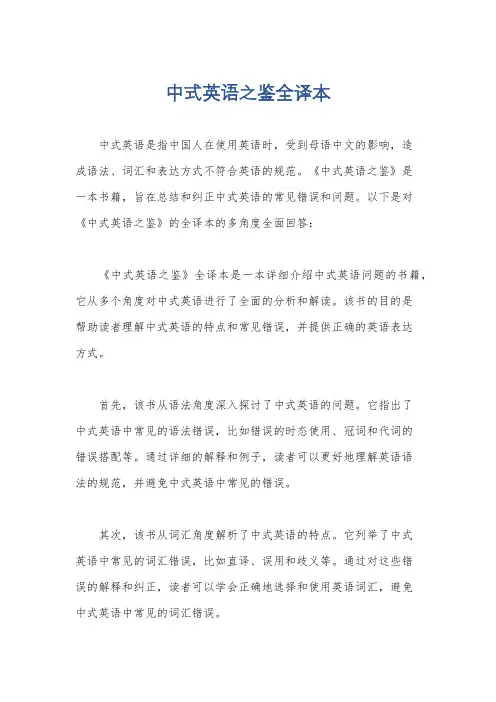
中式英语之鉴全译本中式英语是指中国人在使用英语时,受到母语中文的影响,造成语法、词汇和表达方式不符合英语的规范。
《中式英语之鉴》是一本书籍,旨在总结和纠正中式英语的常见错误和问题。
以下是对《中式英语之鉴》的全译本的多角度全面回答:《中式英语之鉴》全译本是一本详细介绍中式英语问题的书籍,它从多个角度对中式英语进行了全面的分析和解读。
该书的目的是帮助读者理解中式英语的特点和常见错误,并提供正确的英语表达方式。
首先,该书从语法角度深入探讨了中式英语的问题。
它指出了中式英语中常见的语法错误,比如错误的时态使用、冠词和代词的错误搭配等。
通过详细的解释和例子,读者可以更好地理解英语语法的规范,并避免中式英语中常见的错误。
其次,该书从词汇角度解析了中式英语的特点。
它列举了中式英语中常见的词汇错误,比如直译、误用和歧义等。
通过对这些错误的解释和纠正,读者可以学会正确地选择和使用英语词汇,避免中式英语中常见的词汇错误。
此外,该书还从语言习惯和表达方式的角度分析了中式英语的问题。
它指出了中式英语中常见的表达方式不符合英语的习惯和规范,比如过度使用被动语态、使用繁琐的句子结构等。
通过对这些问题的解释和示例,读者可以更好地掌握英语的表达方式,避免中式英语中常见的表达问题。
此外,该书还提供了一些实用的技巧和建议,帮助读者纠正中式英语的问题。
它介绍了一些常用的英语学习资源和方法,以及如何培养良好的英语思维方式和习惯。
通过这些技巧和建议,读者可以更好地提高自己的英语水平,避免中式英语的陷阱。
总之,《中式英语之鉴》全译本是一本全面深入地解析中式英语问题的书籍。
它从语法、词汇、表达方式和学习方法等多个角度进行了全面的分析和解读。
通过阅读该书,读者可以更好地理解和纠正中式英语的问题,提高自己的英语水平。

中式英语之鉴笔记以下是一份中式英语之鉴笔记:一、中式英语的表现1、用词不当:中式英语常常在用词上出现偏差,使用不地道的表达方式。
例如,“I am very happy to help you.”应该翻译为“我很高兴能帮助你。
”而不是“我非常开心可以帮助你。
”。
2、语法错误:中式英语在语法方面常常出现错误,比如使用动词的不当形式,或是在句子的结构上出现问题。
例如,“Yesterday I went to the park and I saw a beautiful sunset.”应该翻译为“昨天我去了公园,看到了美丽的日落。
”而不是“昨天我去了公园我看到了美丽的日落。
”。
3、表达方式生硬:中式英语的表达方式常常显得生硬,不够流畅自然。
例如,“I like this book. It is very interesting.”应该翻译为“我喜欢这本书,它很有趣。
”而不是“我喜欢这本书,它很有趣吗?”二、如何避免中式英语1、多读多听:多读英文原著和新闻报道,多听英语音频和视频,可以提高英语语感和表达能力。
2、学习语法:学习英语语法规则和句型结构,可以帮助你正确地使用英语。
3、写作练习:通过写作练习可以锻炼你的英语表达能力和思维能力。
4、请外教指导:请外教指导你的英语表达,指出你的问题所在,可以帮助你纠正中式英语的错误。
三、中式英语之鉴示例1、“I very like English.”(错误)正确翻译:“I like English very much.”(正确)2、“She is beautiful than me.”(错误)正确翻译:“She is more beautiful than me.”(正确)3、“I have two books in my hand.”(错误)正确翻译:“I have two books in my hands.”(正确)总之,要避免中式英语的出现,需要不断的学习和实践。
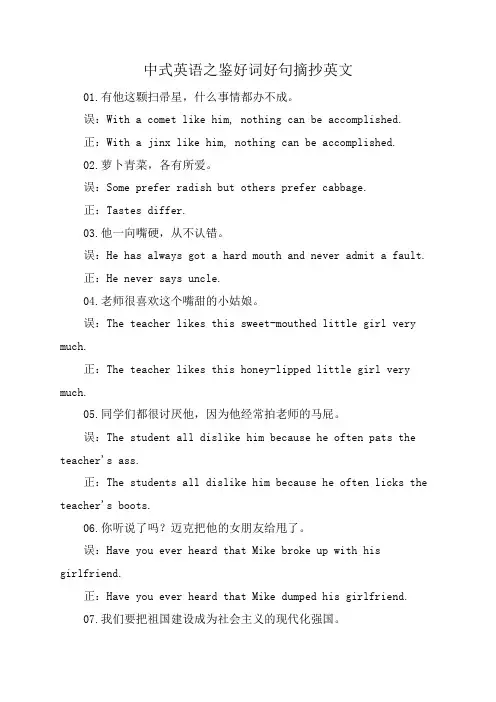
中式英语之鉴好词好句摘抄英文01.有他这颗扫帚星,什么事情都办不成。
误:With a comet like him, nothing can be accomplished.正:With a jinx like him, nothing can be accomplished.02.萝卜青菜,各有所爱。
误:Some prefer radish but others prefer cabbage.正:Tastes differ.03.他一向嘴硬,从不认错。
误:He has always got a hard mouth and never admit a fault.正:He never says uncle.04.老师很喜欢这个嘴甜的小姑娘。
误:The teacher likes this sweet-mouthed little girl very much.正:The teacher likes this honey-lipped little girl very much.05.同学们都很讨厌他,因为他经常拍老师的马屁。
误:The student all dislike him because he often pats the teacher's ass.正:The students all dislike him because he often licks the teacher's boots.06.你听说了吗?迈克把他的女朋友给甩了。
误:Have you ever heard that Mike broke up with his girlfriend.正:Have you ever heard that Mike dumped his girlfriend.07.我们要把祖国建设成为社会主义的现代化强国。
误:We will build our motherland into a socialist modern powerful country.正:We will build our motherland into a modern powerful socialist country.08.人都是这山望着那山高,对自己的现状没有满意的时候。
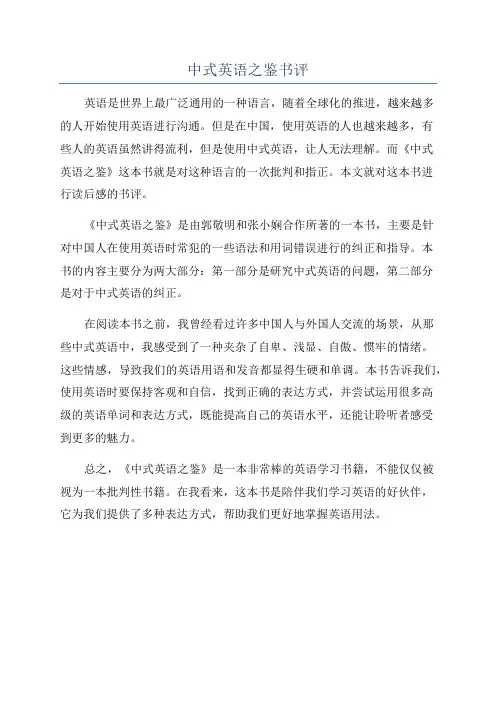
中式英语之鉴书评
英语是世界上最广泛通用的一种语言,随着全球化的推进,越来越多
的人开始使用英语进行沟通。
但是在中国,使用英语的人也越来越多,有
些人的英语虽然讲得流利,但是使用中式英语,让人无法理解。
而《中式
英语之鉴》这本书就是对这种语言的一次批判和指正。
本文就对这本书进
行读后感的书评。
《中式英语之鉴》是由郭敬明和张小娴合作所著的一本书,主要是针
对中国人在使用英语时常犯的一些语法和用词错误进行的纠正和指导。
本
书的内容主要分为两大部分:第一部分是研究中式英语的问题,第二部分
是对于中式英语的纠正。
在阅读本书之前,我曾经看过许多中国人与外国人交流的场景,从那
些中式英语中,我感受到了一种夹杂了自卑、浅显、自傲、惯牢的情绪。
这些情感,导致我们的英语用语和发音都显得生硬和单调。
本书告诉我们,使用英语时要保持客观和自信,找到正确的表达方式,并尝试运用很多高
级的英语单词和表达方式,既能提高自己的英语水平,还能让聆听者感受
到更多的魅力。
总之,《中式英语之鉴》是一本非常棒的英语学习书籍,不能仅仅被
视为一本批判性书籍。
在我看来,这本书是陪伴我们学习英语的好伙伴,
它为我们提供了多种表达方式,帮助我们更好地掌握英语用法。
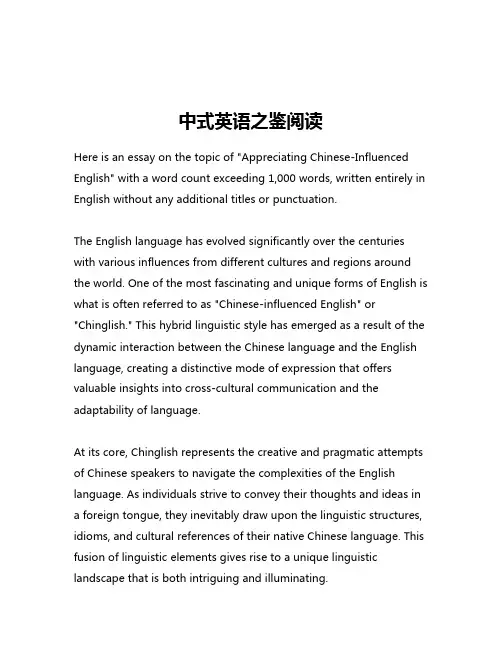
中式英语之鉴阅读Here is an essay on the topic of "Appreciating Chinese-Influenced English" with a word count exceeding 1,000 words, written entirely in English without any additional titles or punctuation.The English language has evolved significantly over the centuries with various influences from different cultures and regions around the world. One of the most fascinating and unique forms of English is what is often referred to as "Chinese-influenced English" or "Chinglish." This hybrid linguistic style has emerged as a result of the dynamic interaction between the Chinese language and the English language, creating a distinctive mode of expression that offers valuable insights into cross-cultural communication and the adaptability of language.At its core, Chinglish represents the creative and pragmatic attempts of Chinese speakers to navigate the complexities of the English language. As individuals strive to convey their thoughts and ideas in a foreign tongue, they inevitably draw upon the linguistic structures, idioms, and cultural references of their native Chinese language. This fusion of linguistic elements gives rise to a unique linguistic landscape that is both intriguing and illuminating.One of the most prominent features of Chinglish is the direct translation of Chinese idioms and expressions into English. This process, known as "literal translation," often results in phrases that may seem nonsensical or humorous to native English speakers, but which carry profound meaning and cultural significance in the Chinese context. For instance, the Chinglish phrase "the old man under the tree" might be a direct translation of the Chinese idiom "树下老人," which refers to a wise and experienced individual who imparts valuable knowledge and guidance. Similarly, the expression "to add oil" in Chinglish is a literal translation of the Chinese phrase "加油," which is used to encourage and motivate others. These linguistic quirks not only highlight the differences between the two languages but also offer a glimpse into the unique worldviews and cultural perspectives of Chinese speakers.Moreover, Chinglish often reflects the influence of Chinese grammatical structures on the usage of English. Chinese is a language that is characterized by its conciseness and the omission of certain grammatical elements, such as articles and pronouns. When Chinese speakers translate these linguistic features directly into English, the result can be sentences that appear incomplete or unconventional to native English speakers. For example, the Chinglish phrase "I go to school" might be a direct translation of the Chinese sentence "我去上学," where the pronoun "I" and the article"the" are omitted. While this construction may seem unnatural in standard English, it reflects the underlying logic and linguistic patterns of the Chinese language.Interestingly, Chinglish also showcases the creative and adaptive nature of language. As Chinese speakers grapple with the challenges of expressing themselves in English, they often develop novel ways of using words and phrases that defy the conventional norms of the language. This linguistic creativity can be seen in the coining of new terms, the repurposing of existing words, and the blending of Chinese and English elements. For instance, the term "self-service" in Chinglish might be used to refer to a situation where an individual is expected to take care of their own needs, rather than relying on the assistance of others. This innovative usage of the term "self-service" reflects the practical and resourceful mindset of Chinese speakers as they navigate the linguistic landscape of English.Furthermore, Chinglish can be seen as a testament to the resilience and adaptability of the English language. As it encounters and assimilates influences from diverse cultural and linguistic backgrounds, English demonstrates its remarkable capacity to evolve and accommodate new forms of expression. The emergence of Chinglish not only enriches the global tapestry of English but also highlights the language's ability to serve as a medium for cross-cultural exchange and understanding.In the realm of business and international communication, Chinglish can play a crucial role in bridging cultural divides and facilitating effective dialogue. As Chinese companies and individuals engage with the global marketplace, their use of Chinglish can provide valuable insights into their thought processes, cultural references, and communication styles. By understanding and appreciating the nuances of Chinglish, native English speakers can cultivate a deeper appreciation for the cultural context and perspectives of their Chinese counterparts, ultimately leading to more productive and meaningful exchanges.Moreover, the study of Chinglish can offer valuable lessons in language learning and intercultural communication. By examining the patterns and mechanisms underlying Chinglish, linguists and educators can gain valuable insights into the challenges and strategies employed by language learners. This knowledge can inform the development of more effective language teaching methodologies and materials, helping to bridge the gap between the Chinese and English languages and fostering greater cross-cultural understanding.In conclusion, the phenomenon of Chinglish is a fascinating and multifaceted aspect of the English language. It represents the creative and adaptive efforts of Chinese speakers to navigate thelinguistic landscape of English, while also reflecting the rich cultural heritage and unique perspectives of the Chinese language. By appreciating and studying Chinglish, we can gain a deeper understanding of the dynamic interplay between language and culture, and the remarkable resilience and adaptability of the English language as it continues to evolve and embrace diverse influences from around the world.。
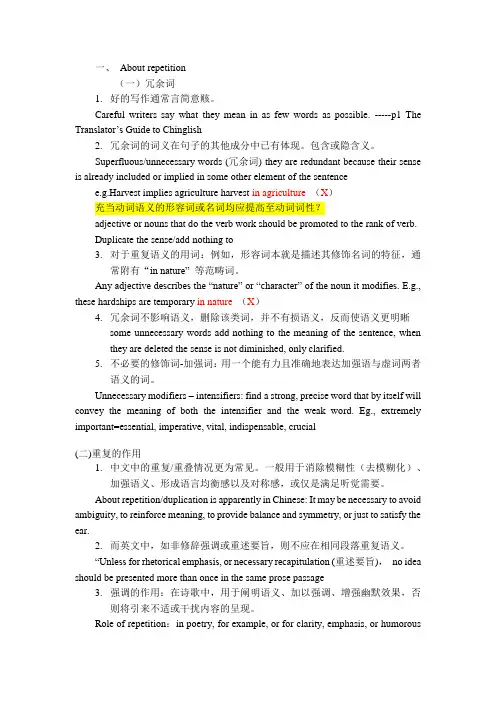
一、About repetition(一)冗余词1.好的写作通常言简意赅。
Careful writers say what they mean in as few words as possible. -----p1 The Translator’s Guide to Chinglish2.冗余词的词义在句子的其他成分中已有体现。
包含或隐含义。
Superfluous/unnecessary words (冗余词) they are redundant because their sense is already included or implied in some other element of the sentencee.g.Harvest implies agriculture harvest in agriculture (X)充当动词语义的形容词或名词均应提高至动词词性?adjective or nouns that do the verb work should be promoted to the rank of verb.Duplicate the sense/add nothing to3.对于重复语义的用词:例如,形容词本就是描述其修饰名词的特征,通常附有“in nature” 等范畴词。
A ny adjective describes the “nature” or “character” of the noun it modifies. E.g., these hardships are temporary in nature(X)4.冗余词不影响语义,删除该类词,并不有损语义,反而使语义更明晰some unnecessary words add nothing to the meaning of the sentence, whenthey are deleted the sense is not diminished, only clarified.5.不必要的修饰词-加强词:用一个能有力且准确地表达加强语与虚词两者语义的词。
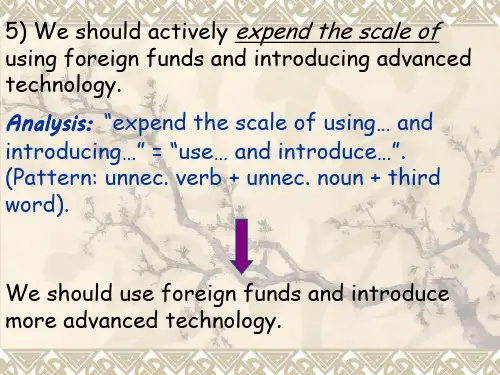
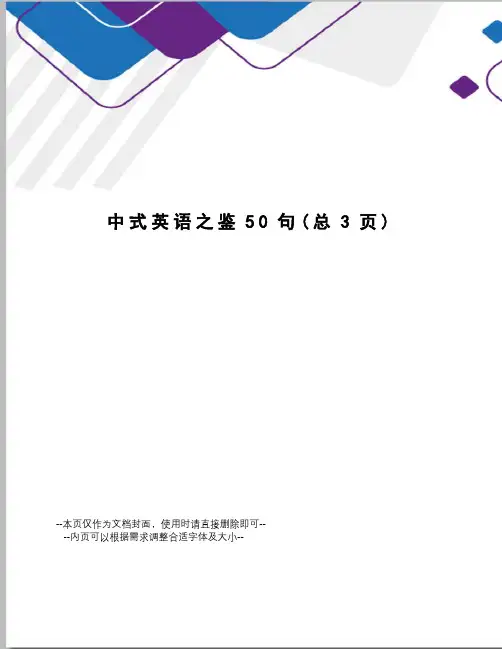
中式英语之鉴50句(总3页)--本页仅作为文档封面,使用时请直接删除即可----内页可以根据需求调整合适字体及大小--01.这个教授教得很烂。
[误] The professor teaches badly.[正] The professor is so terrible.02.北京申奥成功的消息令我们热血沸腾。
[误] Beijing's winning the bid for the Olympics makes our blood boil.[正] Beijing's winning the bid for the Olympics makes us excited.(make one's spine tingle)03.别听他们胡说八道,根本就没那回事。
[误] Don't listen to their babbling. Nothing of the sort.[正] Don't be fooled by their babbling. Nothing of the sort.04.我们这儿的人都觉得他有婚外恋。
[误] People around here all feel that he has affairs outside his own marriage.[正] People around here all feel that he is leading a double life.05.别看别人不把她当回事,在家里她可是父亲的掌上明珠。
[误] Although other people never take her serious, she is the pearl on her father's hand at home. [正] Although other people never take her serious, she is the apple of her father's eye at home.06.都十点钟了。
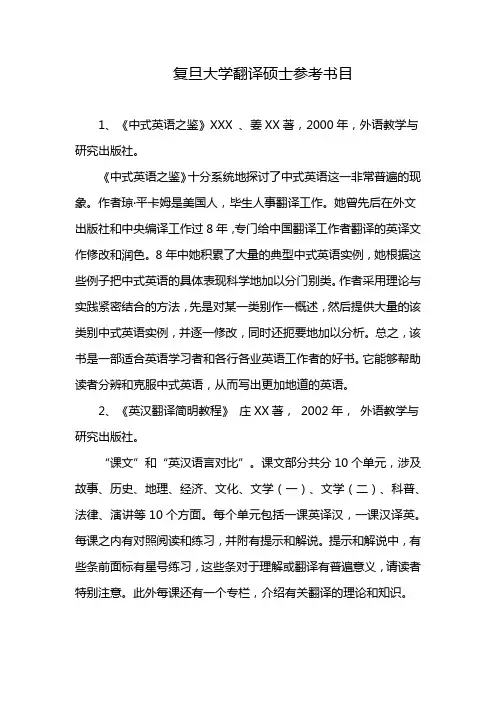
复旦大学翻译硕士参考书目1、《中式英语之鉴》XXX 、姜XX著,2000年,外语教学与研究出版社。
《中式英语之鉴》十分系统地探讨了中式英语这一非常普遍的现象。
作者琼·平卡姆是美国人,毕生人事翻译工作。
她曾先后在外文出版社和中央编译工作过8年,专门给中国翻译工作者翻译的英译文作修改和润色。
8年中她积累了大量的典型中式英语实例,她根据这些例子把中式英语的具体表现科学地加以分门别类。
作者采用理论与实践紧密结合的方法,先是对某一类别作一概述,然后提供大量的该类别中式英语实例,并逐一修改,同时还扼要地加以分析。
总之,该书是一部适合英语学习者和各行各业英语工作者的好书。
它能够帮助读者分辨和克服中式英语,从而写出更加地道的英语。
2、《英汉翻译简明教程》庄XX著,2002年,外语教学与研究出版社。
“课文”和“英汉语言对比”。
课文部分共分10个单元,涉及故事、历史、地理、经济、文化、文学(一)、文学(二)、科普、法律、演讲等10个方面。
每个单元包括一课英译汉,一课汉译英。
每课之内有对照阅读和练习,并附有提示和解说。
提示和解说中,有些条前面标有星号练习,这些条对于理解或翻译有普遍意义,请读者特别注意。
此外每课还有一个专栏,介绍有关翻译的理论和知识。
3、《级英汉翻译理论与实践》叶XX著,2001年,XX大学出版社。
这本专著是英语专业系列教材,也是不少学校研究生入学考试必读的参考书目。
该书很好地将英汉翻译理论讲解与翻译实践指导相结合。
第一部分为理论技巧篇,共16章,综述翻译基本概念、技巧,对比语言文化,评介中西评论;第二部分为翻译实践篇,节录社会人文、科技法律、小说诗文等领域的英文篇章十五篇作为练习,提供两种具有代表性的参考译文,并加上详细精到的注释和札记。
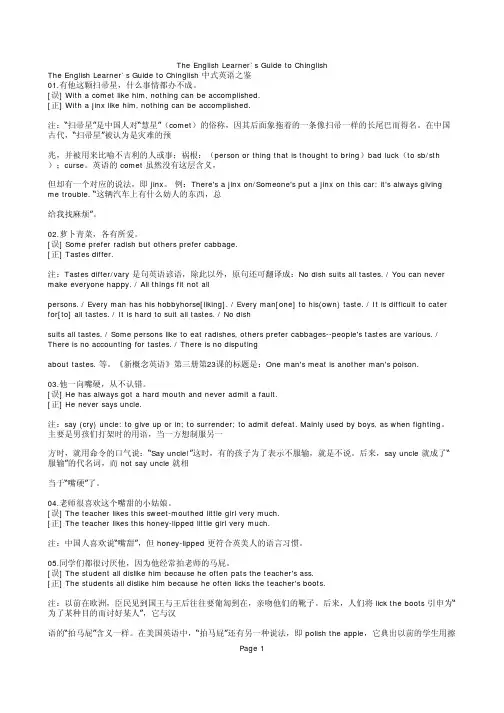
The English Learner`s Guide to ChinglishThe English Learner`s Guide to Chinglish 中式英语之鉴01.有他这颗扫帚星,什么事情都办不成。
[误] With a comet like him, nothing can be accomplished.[正] With a jinx like him, nothing can be accomplished.注:“扫帚星”是中国人对“慧星”(comet)的俗称,因其后面象拖着的一条像扫帚一样的长尾巴而得名。
在中国古代,“扫帚星”被认为是灾难的预兆,并被用来比喻不吉利的人或事;祸根:(person or thing that is thought to bring)bad luck(to sb/sth );curse。
英语的 comet 虽然没有这层含义,但却有一个对应的说法,即 jinx。
例:There's a jinx on/Someone's put a jinx on this car: it's always giving me trouble. “这辆汽车上有什么妨人的东西,总给我找麻烦”。
02.萝卜青菜,各有所爱。
[误] Some prefer radish but others prefer cabbage.[正] Tastes differ.注:Tastes differ/vary 是句英语谚语,除此以外,原句还可翻译成:No dish suits all tastes. / You can never make everyone happy. / All things fit not allpersons. / Every man has his hobbyhorse[liking]. / Every man[one] to his(own) taste. / It is difficult to cater for[to] all tastes. / It is hard to suit all tastes. / No dishsuits all tastes. / Some persons like to eat radishes, others prefer cabbages--people's tastes are various. / There is no accounting for tastes. / There is no disputingabout tastes. 等。
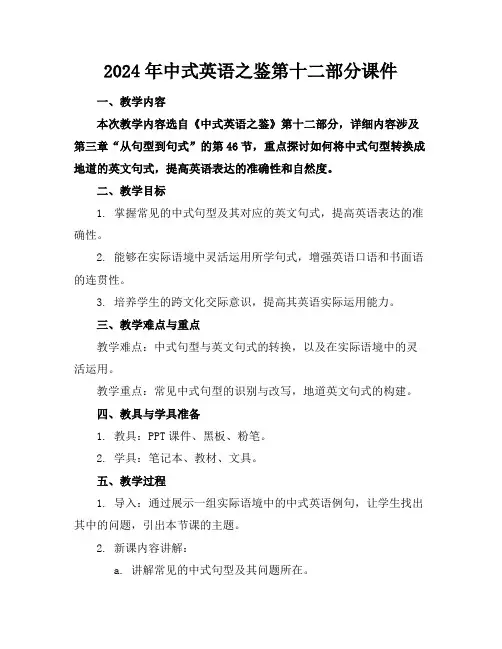
2024年中式英语之鉴第十二部分课件一、教学内容本次教学内容选自《中式英语之鉴》第十二部分,详细内容涉及第三章“从句型到句式”的第46节,重点探讨如何将中式句型转换成地道的英文句式,提高英语表达的准确性和自然度。
二、教学目标1. 掌握常见的中式句型及其对应的英文句式,提高英语表达的准确性。
2. 能够在实际语境中灵活运用所学句式,增强英语口语和书面语的连贯性。
3. 培养学生的跨文化交际意识,提高其英语实际运用能力。
三、教学难点与重点教学难点:中式句型与英文句式的转换,以及在实际语境中的灵活运用。
教学重点:常见中式句型的识别与改写,地道英文句式的构建。
四、教具与学具准备1. 教具:PPT课件、黑板、粉笔。
2. 学具:笔记本、教材、文具。
五、教学过程1. 导入:通过展示一组实际语境中的中式英语例句,让学生找出其中的问题,引出本节课的主题。
2. 新课内容讲解:a. 讲解常见的中式句型及其问题所在。
b. 对比分析中式句型与英文句式的差异,引导学生掌握转换方法。
c. 举例说明如何在实际语境中运用所学句式。
3. 例题讲解:选取具有代表性的例题,详细讲解解题思路和步骤。
4. 随堂练习:布置相关练习题,让学生巩固所学内容。
5. 小组讨论:分组讨论实际语境中的问题,培养学生团队协作和解决问题的能力。
六、板书设计1. 《中式英语之鉴》第十二部分2. 主要内容:a. 常见中式句型及其问题b. 中式句型与英文句式的转换方法c. 实际语境中的句式运用七、作业设计1. 作业题目:2. 答案:a. (答案略)b. (答案略)八、课后反思及拓展延伸1. 反思:本次课程中,学生对中式句型与英文句式的转换掌握程度如何?哪些环节需要加强?2. 拓展延伸:a. 鼓励学生阅读英文原版书籍,提高英语语感。
b. 建议学生关注日常生活中的中式英语现象,进行自我纠正和改进。
c. 组织英语角活动,让学生在真实语境中练习所学句式,提高英语实际运用能力。
D W T T D y有他这颗扫帚星,什么事情都办不成。
【误】With a co met like him,no thing canbe acco mplished.【正】With a jinx like him,no thing can be acco mplished.注:“扫帚星”是中国人对“慧星”(comet )的俗称,因其后面像拖着的一条扫帚一样的长尾巴而得名。
在中国古代,“扫帚星”被认为是灾难的预兆,并被用来比喻不吉利的人或事;“祸根”在英语中对应的说法是jinx 。
萝卜青菜,各有所爱。
【误】So me prefer radish but others pre-fer cabbage.【正】T astes differ.注:tastes differ/vary 是句英语谚语,原句还可翻译成No dish suits all tastes.或You can nev er make everyo ne happy.他一向嘴硬,从不认错。
【误】He has alw ays go t a hard mo uthand nev er admit a fault.【正】He never says uncle.注:say (cry)uncle 主要是男孩们打架时的用语,当一方想制服另一方时,就用命令的口气说:“Say uncle!”这时,有的孩子为了表示不服输,就是不说。
后来,say uncle 就成了“服输”的代名词,而not say uncle 就相当于“嘴硬”了。
同学们都很讨厌他,因为他经常拍老师的马屁。
【误】The students all dislike him be-cause he o ften pats the teacher ’s ass.【正】The students all dislike him be-cause he o ften licks the teacher ’s boo ts.注:以前在欧洲,臣民见到国王与王后往往要亲吻他们的靴子。
Unnecessary Modifiers中式英语之鉴冗余性修饰语可以分为5类:1. 冗余修饰语2. ⾃明修饰语3. 强调成分4. 限定修饰词(尤指形容词或副词)5. 陈词滥调冗余修饰语许多从中⽂翻译过去的形容词和副词,在英语中是多余的。
定义:其含义已经包含或隐含在句⼦其他成分或被修饰成分中的形容词和副词。
明显的冗余修饰语,如:advance forecast [天⽓预报本身就是提前的]female businesswoman Liu Zhihua [woman包含了female⼥性的意思]new innovations[发明包含了新的含义]mutual cooperation[合作本身就是共同的,双⽅或多⽅的]可省略:被修饰成分⾃带含义,约定俗成的表达,⼥性化/男性化的名字(⽆需强调性别)或者逻辑⾃带。
时间副词还有⼀类经常出现在中式英语中的冗余性修饰语就是表示动作发⽣时间的副词和表达时间的名词短语,如:at present, in the future, in the past,因为它们的含义已经通过动词的时态表达出来了。
A: now the government is working hard to improve taxationB: the government is working hard to improve taxation[现在进⾏时包含“现在“]A: previously we used to overemphasize the need for class struggleB: we used to overemphasize the need for class struggle[过去时包含”之前“]“Various”另⼀个中式英语中典型的冗余修饰语就是形容词“various”。
在中⽂中,“various”经常⽤来表示复数,但在英语⾥,复数已经以名词结尾-s的形式出现了,所以⽆需赘述。
中式英语之鉴中式英语中国的中文环境中改写、翻译产生的英语,是比较特殊的一种英语。
它几乎每一个句子都有中国式的表达方式,作为一种新的英语表达方式,它被不断地使用着,也是国际英语表达中的一种文化交流方式。
既然由于它的特殊性,值得总结、提炼,让更多的人来了解它、学习它。
这里就根据中式英语的特点进行一个总结,希望能够对大家学习中式英语有所帮助。
首先,中式英语在表达方式上,有着明显的中国特色,往往它的句子结构和表达方式都和一般的英语语法比较不同,很多时候我们就会让人感到非常新颖。
比如,“中国有着被全世界所尊敬的传统文化”,就会写成“中国传统文化受全世界尊敬”。
这种句式,在汉语环境中是可以使用的,但在英文环境中却往往是很难言传达的,而中式英语正是把这种中文表达方式翻译成英文来使用的。
其次,中式英语偏重于后置定语,而不像正统的英语一样,往往强调前置定语的使用。
比如,“全世界尊敬的中国传统文化”,正确的英语表达是“the traditional Chinese culture respected by the world”,而中式英语却是“Chinese traditional culture respected by the world”。
再比如,一般来说,正确英语表达“他结识了很多朋友”,应该用“He made many friends”,而中式英语却用“He got to know many friends”。
从这两种句子来看,可以很明显地看出,正确的英语是注重于前置定语,而中式英语则是偏重于后置定语,以这种方式使用英语表达,也是一种特殊的文化表达方式。
此外,中式英语还有一个特点,就是它的字面表达和逻辑表达并不完全一致。
比如,一般地,前者表示“当前的情况”,而后者表示“将来的结果”。
比如,“你的学校有更多的学生”的英文表达,表面上是“Your school has more students”,但真正的逻辑表达应该是“Your school will have more students”,这就是中式英语的一个特殊性所在,也是它与正统英语最大的区别。
中式英语之鉴英文版英文回答:Chinese English, also known as Chinglish, is a blend of English and Chinese languages that is characterized by the use of English words and phrases with Chinese grammar and syntax. It is often used in informal settings, such as social media, text messages, and spoken conversations.There are several reasons why people use Chinese English. Some people find it easier to express themselvesin this way, as it allows them to use familiar Chinese words and phrases while still communicating in English. Others use it as a way to show their cultural identity or to create a sense of humor.Chinese English can sometimes be difficult to understand for native English speakers, as it often uses words and phrases that have different meanings in English. For example, the phrase "no problem" is often used inChinese English to express agreement, whereas in English it usually means that there is no difficulty.Despite its potential for misunderstandings, Chinese English can also be a valuable tool for communication. It can help to bridge the gap between English and Chinese speakers, and it can provide a unique and creative way to express oneself.Here are some examples of Chinese English:Can you give me a ride? -> Can you dai wo yi tiao lu ma?I'm so hungry. -> Wo hen e.What are you doing? -> Ni zai gan ma?I'm going to the store. -> Wo qu mai dongxi.I love you. -> Wo ai ni.中文回答:中式英语,也称为Chinglish,是一种英语和汉语的混合,其特点是用汉语语法和句法来表达英语单词和短语。
中式英语之鉴内容介绍English Answer:A Mirror for Chinglish is a compelling and insightful exploration into the linguistic phenomenon of Chinglish, a hybrid form of Chinese and English that has emerged in the context of globalization and increased intercultural communication. This book serves as a valuable resource for anyone seeking to understand the complexities and nuances of this unique language.Through a comprehensive analysis of Chinglish usage in various domains, including business, advertising, and popular culture, the author uncovers the factors that contribute to its formation and the ways in which it reflects the evolving relationship between China and the West. The book offers a comprehensive overview of the linguistic, cultural, and socioeconomic factors that have given rise to Chinglish.One of the key strengths of this book is its interdisciplinary approach, which draws on insights from linguistics, sociology, and cultural studies to provide a holistic understanding of Chinglish. The author effectively demonstrates how Chinglish is not simply a linguistic curiosity but a reflection of the complex social andcultural dynamics at play in contemporary China.Moreover, the book provides practical guidance for navigating the challenges posed by Chinglish. It offers advice on how to communicate effectively in this hybrid language and how to avoid potential misunderstandings. This practical dimension makes the book useful for professionals, students, and anyone who interacts with Chinglish in their daily lives.Overall, A Mirror for Chinglish is a highly recommended read for anyone interested in the fascinating world of language and culture. Its insightful analysis, interdisciplinary approach, and practical guidance make it an invaluable resource for understanding and navigating the complexities of Chinglish.中文回答:《中式英语之鉴》是一本引人入胜且富有洞察力的作品,探讨了中式英语这一语言现象。
Part One:Unnecessary WordsAll authorities on the style of English prose agree that good writing is concise。
Careful writers say what they mean in as few words as possible。
Vigorous writing is concise。
A sentence should contain no unnecessary words, a paragraph no unnecessary sentences,for the same reason that a drawing should have no unnecessary lines and a machine no unnecessary parts。
It follows that any words which perform no useful function in the sentence-that is ,which add nothing to the meaning—should be edited out.Almost every text that has been translated into English from Chinese( or that has been written directly in English by a native speaker of Chinese) contains unnecessary words. Draft translations are commonly full of them, and even polished final versions are seldom free of them。
Read anything that has been published in English for foreign readers—a magazine article, a news story, an advertisement,a government report-and you are likely to find superfluous words. Read even the shortest of English texts—the label on a food product , a billboard on Chang’an ,the company name on the front of a building—and ,if you are on the alert to recognize them,chances are that you will find words that could and should have been omitted。